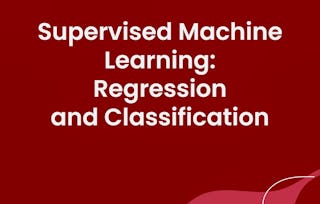This course introduces you to one of the main types of modelling families of supervised Machine Learning: Regression. You will learn how to train regression models to predict continuous outcomes and how to use error metrics to compare across different models. This course also walks you through best practices, including train and test splits, and regularization techniques.

Supervised Machine Learning: Regression

Supervised Machine Learning: Regression
This course is part of multiple programs.



Instructors: Mark J Grover
Access provided by Coursera Learning Team
79,466 already enrolled
821 reviews
Skills you'll gain
- Model Evaluation
- Statistical Analysis
- Applied Machine Learning
- Classification Algorithms
- Machine Learning Algorithms
- Statistical Modeling
- Predictive Modeling
- Scikit Learn (Machine Learning Library)
- Machine Learning
- Logistic Regression
- Supervised Learning
- Feature Engineering
- Regression Analysis
- Data Preprocessing
Details to know

Add to your LinkedIn profile
See how employees at top companies are mastering in-demand skills

Build your subject-matter expertise
- Learn new concepts from industry experts
- Gain a foundational understanding of a subject or tool
- Develop job-relevant skills with hands-on projects
- Earn a shareable career certificate

There are 6 modules in this course
This module introduces a brief overview of supervised machine learning and its main applications: classification and regression. After introducing the concept of regression, you will learn its best practices, as well as how to measure error and select the regression model that best suits your data.
What's included
11 videos3 readings3 assignments2 app items
There are a few best practices to avoid overfitting of your regression models. One of these best practices is splitting your data into training and test sets. Another alternative is to use cross validation. And a third alternative is to introduce polynomial features. This module walks you through the theoretical framework and a few hands-on examples of these best practices.
What's included
7 videos1 reading3 assignments2 app items
There is a trade-off between the size of your training set and your testing set. If you use most of your data for training, you will have fewer samples to validate your model. Conversely, if you use more samples for testing, you will have fewer samples to train your model. Cross Validation will allow you to reuse your data to use more samples for training and testing.
What's included
6 videos1 reading2 assignments2 app items1 plugin
This module walks you through the theory and a few hands-on examples of regularization regressions including ridge, LASSO, and elastic net. You will realize the main pros and cons of these techniques, as well as their differences and similarities.
What's included
10 videos1 reading3 assignments1 app item
In this section, you will understand the relationship between the loss function and the different regularization types.
What's included
5 videos1 reading2 assignments2 app items
In this assignment, you will apply regression techniques to analyze a dataset of your choice. Your task is to preprocess the data, build and compare models, extract insights, and suggest next steps.You will focus on presenting key findings and insights—not the code. You may include visuals to support your analysis, but the report should be a clear summary of your process and conclusions.Your final report will be evaluated by an AI graded tool.
What's included
3 readings2 app items
Earn a career certificate
Add this credential to your LinkedIn profile, resume, or CV. Share it on social media and in your performance review.
Instructors



Offered by
Why people choose Coursera for their career

Felipe M.

Jennifer J.

Larry W.

Chaitanya A.
Learner reviews
- 5 stars
77.22%
- 4 stars
17.29%
- 3 stars
3.16%
- 2 stars
1.09%
- 1 star
1.21%
Showing 3 of 821
Reviewed on Aug 10, 2021
Well structured course. Concepts are explained clearly with hands on exercises.
Reviewed on Sep 30, 2021
very detailed. However, it is better if the gradient decent has its lesson.
Reviewed on Jan 6, 2022
Linear Regression, Ridge, Lasso, Elastic Net, L1 and L2 regularizations... All very well explained theoretically and coded on Jupyter Notebook accordingly.
Explore more from Data Science
¹ Some assignments in this course are AI-graded. For these assignments, your data will be used in accordance with Coursera's Privacy Notice.





